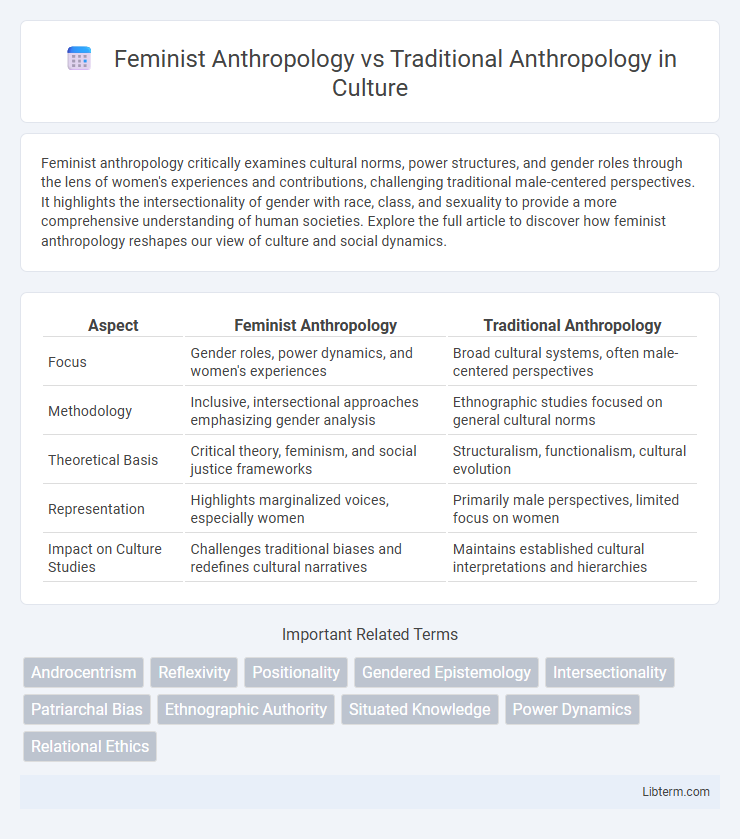Feminist anthropology critically examines cultural norms, power structures, and gender roles through the lens of women's experiences and contributions, challenging traditional male-centered perspectives. It highlights the intersectionality of gender with race, class, and sexuality to provide a more comprehensive understanding of human societies. Explore the full article to discover how feminist anthropology reshapes our view of culture and social dynamics.
Table of Comparison
| Aspect | Feminist Anthropology | Traditional Anthropology |
|---|---|---|
| Focus | Gender roles, power dynamics, and women's experiences | Broad cultural systems, often male-centered perspectives |
| Methodology | Inclusive, intersectional approaches emphasizing gender analysis | Ethnographic studies focused on general cultural norms |
| Theoretical Basis | Critical theory, feminism, and social justice frameworks | Structuralism, functionalism, cultural evolution |
| Representation | Highlights marginalized voices, especially women | Primarily male perspectives, limited focus on women |
| Impact on Culture Studies | Challenges traditional biases and redefines cultural narratives | Maintains established cultural interpretations and hierarchies |
Defining Feminist Anthropology
Feminist Anthropology redefines traditional anthropology by centering gender as a crucial analytical category, challenging male-centric perspectives and uncovering marginalized women's experiences across cultures. It critiques conventional methodologies and epistemologies that have historically overlooked power imbalances and gender inequality. By integrating feminist theory, it aims to produce more inclusive, socially engaged anthropological knowledge that addresses issues of sexism and patriarchy globally.
Core Principles of Traditional Anthropology
Traditional anthropology centers on the holistic study of human societies through cultural, biological, linguistic, and archaeological perspectives, emphasizing objective observation and ethnographic fieldwork. It prioritizes cultural relativism, seeking to understand cultural practices without ethnocentric bias, and often focuses on structural functionalism to analyze social institutions. Core principles include participant observation, empirical data gathering, and comparative analysis to construct comprehensive representations of diverse human cultures.
Historical Development and Evolution
Feminist Anthropology emerged in the 1970s as a critical response to Traditional Anthropology's male-centric narratives, emphasizing gender as a central category of analysis in understanding cultures. This subfield challenges earlier anthropological theories by highlighting women's roles, experiences, and contributions historically marginalized or ignored. The evolution of Feminist Anthropology has transformed ethnographic methods and interpretive frameworks, fostering more inclusive and reflexive approaches to cultural studies.
Key Theoretical Approaches
Feminist Anthropology critiques Traditional Anthropology by emphasizing gender as a central analytical category, challenging androcentric biases inherent in classic ethnographic research. It adopts intersectionality to explore how race, class, and sexuality intersect with gender, offering a more nuanced understanding of power dynamics and social structures. Traditional Anthropology typically prioritizes universal cultural patterns, while Feminist Anthropology foregrounds lived experiences and the agency of marginalized groups in shaping cultural narratives.
Gender Bias in Anthropological Research
Feminist anthropology critically addresses gender bias prevalent in traditional anthropology by highlighting how male-centered perspectives have historically shaped research methodologies and interpretations. Traditional anthropology often marginalized women's experiences, overlooking gender as a crucial analytic category. Feminist anthropologists prioritize intersectional analysis, emphasizing diverse gender identities and advocating for more inclusive and accurate representations of societies.
Methodological Innovations in Feminist Anthropology
Feminist anthropology introduced methodological innovations by emphasizing reflexivity, participant collaboration, and intersectional analyses, challenging traditional anthropology's often detached and male-centric perspectives. It prioritizes qualitative methods such as ethnography with a focus on gender roles, power dynamics, and lived experiences of women and marginalized groups. This approach fosters more inclusive and nuanced understandings of cultures, addressing biases present in conventional anthropological research methods.
Representation of Women in Anthropological Studies
Feminist Anthropology critically challenges Traditional Anthropology's historical underrepresentation and misrepresentation of women by emphasizing women's roles, experiences, and perspectives across cultures. This approach highlights gender as a fundamental category of analysis, revealing power dynamics and social inequalities often overlooked in traditional ethnographies. By prioritizing inclusivity and reflexivity, Feminist Anthropology enriches the understanding of cultural diversity and social structures through a gender-sensitive lens.
Impact on Ethnographic Fieldwork
Feminist anthropology challenges traditional anthropology by emphasizing the inclusion of women's experiences and gender analysis in ethnographic fieldwork, which historically marginalized these perspectives. This approach enhances the understanding of social dynamics by uncovering power relations and cultural norms related to gender that traditional methods often overlooked. As a result, feminist anthropology enriches ethnographic data with nuanced insights about identity, intersectionality, and agency, transforming both methodology and interpretation in fieldwork.
Contributions to Social Change and Advocacy
Feminist Anthropology advances social change by centering gender equity, exposing power imbalances, and challenging patriarchal norms within cultural studies, thereby promoting advocacy for marginalized women and LGBTQ+ communities. Traditional Anthropology, while foundational in understanding human cultures, often reinforces existing hierarchies by maintaining male-centric perspectives and less emphasis on activism. The feminist approach transforms anthropological research into a tool for social justice, influencing policies and fostering inclusive representation in academic and social arenas.
Future Directions in Anthropological Scholarship
Feminist anthropology emphasizes intersectionality, gender dynamics, and power structures, challenging traditional anthropology's often Eurocentric and male-dominated perspectives. Future directions in anthropological scholarship will integrate decolonial approaches and amplify marginalized voices, fostering more inclusive, nuanced analyses of social identities and cultural practices. Advancements in digital ethnography and interdisciplinary methods are expected to further transform the field, promoting ethical reflexivity and global collaboration.
Feminist Anthropology Infographic

 libterm.com
libterm.com